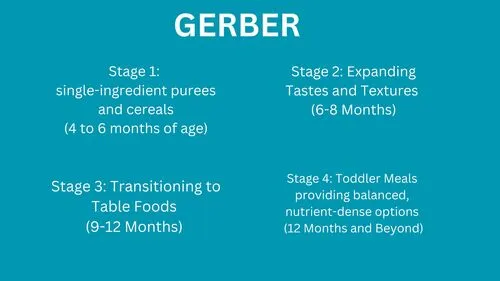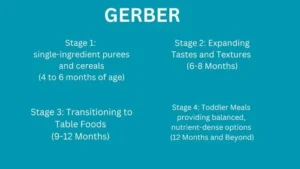Table of Contents
ToggleNourishing Your Baby with Wholesome Ingredients at Every Stage
When it comes to feeding your baby, choosing the right food is crucial. As parents become more conscious of what goes into their children’s meals, many are turning to organic baby food options for their nutritional purity and safety. With decades of parent trust, Gerber Organic Baby Food provides a wide variety of organic, healthy, and nourishing baby food products. With a focus on high-quality ingredients and tailored to meet the developmental needs of babies at various stages, Gerber’s organic offerings provide parents with a safe and convenient way to nourish their little ones.
In this article, we will explore the benefits of Gerber Organic Baby Food, highlight the ingredients that make up these products, and delve into the different stages of baby food offerings that Gerber provides. Whether you’re introducing solids to your baby or looking for an organic snack, Gerber Organic Baby Food is a reliable and healthy option.
Why Choose Gerber Organic Baby Food?
Gerber is a household name in baby food and has been synonymous with quality, safety, and nutritional value for over 90 years. The U.S. Department of Agriculture has certified the company’s line of baby food products as organic, demonstrating their dedication to organic food. The following explains why many parents choose to feed their infants Gerber Organic Baby Food:
1. Certified Organic Ingredients
Gerber Organic Baby Food uses only ingredients that are grown without synthetic pesticides, fertilizers, or genetically modified organisms (GMOs). Organic farming practices focus on preserving soil health, reducing environmental impact, and providing products that are free from harmful chemicals.
2. Safe and Nutritious
Gerber ensures that all of its organic baby food products meet rigorous quality standards. Their foods are free from artificial flavors, preservatives, and colors. This means that when you choose Gerber Organic Baby Food, you are giving your baby the purest, most natural ingredients possible.
3. Convenient for Parents
Gerber Organic Baby Food offers a wide range of baby food products in jars, pouches, cereals, and snacks. These options provide convenience for busy parents who want healthy and nutritious meals for their babies without spending hours in the kitchen.
4. Trusted Brand
With decades of experience in the baby food industry, Gerber has built a reputation for delivering quality products that parents can trust. Their organic range is no exception, offering a variety of choices for every developmental stage.
Understanding the Stages of Gerber Organic Baby Food
Baby food needs to be introduced gradually, in a manner that suits a baby’s developmental stage. As babies grow, their nutritional requirements and ability to consume different textures change. Gerber Organic Baby Food has developed a range of products designed to meet these needs at each stage of a baby’s growth. Here is an overview of the different stages and corresponding products Gerber offers.
Introducing Solids (4-6 Months):
The First Step in Your Baby’s Nutritional Journey
Introducing solid foods to your baby is an exciting milestone, typically occurring around 4 to 6 months of age. At this stage, breast milk or formula remains the primary source of nutrition, but small amounts of solids can be introduced to help babies explore new flavors and textures. Gerber Organic Baby Food offers an excellent range of Stage 1 products specifically designed for this phase, with smooth, single-ingredient purees and cereals that are gentle on your baby’s developing digestive system.
Signs Your Baby is Ready for Solids
Before introducing solids, it’s important to ensure your baby is developmentally ready. Here are some signs to watch for:
- Good Head Control: Your baby can hold their head up steadily.
- Sitting Up with Support: They can sit upright in a high chair or supported seat.
- Interest in Food: Your baby shows curiosity about what you’re eating, reaching for food or opening their mouth when offered a spoon.
- Loss of Tongue-Thrust Reflex: Babies naturally push food out of their mouths with their tongues; when this reflex diminishes, they’re ready to try solids.
- Doubling Birth Weight: Many babies are ready for solids once they’ve doubled their birth weight, typically around 4-6 months.
Note: Most babies are ready for solids between 4-6 months, but it’s important to consult a pediatrician.
Gerber Organic Stage 1 Baby Foods
Gerber Organic Stage 1 Baby Foods are ideal for babies beginning their journey with solids. These products are made from single, organic ingredients, offering a simple and safe introduction to new tastes.
1. Gerber Organic Baby Cereals
Cereals are a popular first food because they are easy to prepare and rich in iron, a critical nutrient for brain development. Gerber Organic cereals can be mixed with breast milk, formula, or water to create a smooth consistency that’s easy for babies to swallow.
Popular Options:
- Gerber Organic Rice Cereal: Made from organic rice, this cereal is a gentle, iron-fortified option.
- Gerber Organic Oatmeal Cereal: A whole-grain alternative that provides fiber and essential nutrients.
Key Nutrients:
- Iron: Supports brain development.
- Vitamin B: Essential for energy production.
- Calcium: Aids in bone and teeth development.
2. Gerber Organic Purees
Pureed fruits and vegetables are perfect for introducing babies to the natural sweetness and mild flavors of whole foods. Gerber Organic purees come in convenient jars and pouches and are free from added sugars, salt, or artificial preservatives.
Popular Single-Ingredient Purees:
- Gerber Organic Apple Puree: A naturally sweet and gentle option.
- Gerber Organic Sweet Potato Puree: Rich in vitamin A, supporting vision and immune health.
- Gerber Organic Carrot Puree: Provides beta-carotene and antioxidants.
- Gerber Organic Pear Puree: A mild, easily digestible fruit puree.
Key Benefits:
- Simple Ingredients: Single-ingredient purees reduce the risk of allergies and make it easier to identify potential food sensitivities.
- Smooth Texture: Perfect for babies who are just learning to swallow solids.
- No Artificial Additives: Ensures your baby is getting pure, wholesome nutrition.
How to Introduce Gerber Organic Baby Food
Introducing solids should be a gradual process. Here’s a step-by-step guide to help you get started:
1. Start with Small Portions
Begin with 1-2 teaspoons of cereal or puree once a day. Gradually increase the quantity as your baby becomes more comfortable with eating solids.
2. Use a Soft-Tipped Spoon
A soft, baby-friendly spoon ensures gentle feeding without hurting your baby’s gums.
3. Offer Solids After Breastfeeding or Formula
Since milk is still their main source of nutrition, offer solids after nursing or bottle-feeding to ensure your baby gets the calories they need.
4. Introduce One Food at a Time
Wait 3-5 days between introducing new foods to monitor for any allergic reactions, such as rash, vomiting, or diarrhea.
5. Create a Routine
Offer solids at the same time each day to establish a feeding routine. Morning or midday feedings are ideal so you can observe your baby for any reactions.
Key Ingredients in Stage 1 Products:
- Organic Fruits: Apples, pears, bananas, and peaches are common ingredients in Gerber’s Stage 1 purees. These fruits are rich in essential vitamins and minerals like vitamin C, which supports the immune system.
- Organic vegetables: vegetables such as sweet potatoes, carrots, peas, and squash are used in these purees. These vegetables are a good source of vitamins A, C, and fiber, which are essential for a baby’s growth and digestive health.
- Organic Grains: Stage 1 cereals, such as Gerber Organic Rice Cereal and Organic Oatmeal Cereal, are made with whole grains. These cereals are rich in iron, which is crucial for developing babies to support their cognitive development and overall growth.
Stage 2: Expanding Tastes and Textures (6-8 Months)
As your baby grows and becomes more comfortable with eating solids, their nutritional needs and ability to handle different textures also evolve. Between 6 and 8 months, your baby is ready for Stage 2 foods, which introduce more diverse flavors, combinations, and slightly thicker textures. This stage is about expanding your baby’s palate while continuing to support their developmental milestones.
Gerber Organic Stage 2 Baby Foods are specifically designed to meet these needs, offering a variety of nutrient-rich options to help your baby explore and enjoy new tastes and textures.
Signs Your Baby is Ready for Stage 2 Foods
Not every baby transitions to Stage 2 foods at the same pace, but here are some common signs that your baby is ready:
- Improved Swallowing Skills: Your baby can handle slightly thicker textures without difficulty.
- Increased Appetite: They may seem hungry and ready for more substantial meals beyond single-ingredient purées.
- Interest in Varied Flavors: Your baby shows curiosity about new flavors and combinations.
- Sitting Up with Little Support: They can sit upright with minimal assistance, which is important for safe eating.
- Chewing Motion: Even without teeth, babies begin to mimic chewing motions with their gums.
Gerber Organic Stage 2 Baby Food: Key Features
Gerber Organic Stage 2 products help introduce more complex flavors and combinations while ensuring your baby gets essential nutrients. These products come in purees, cereals, and protein-packed meals with dual or multi-ingredient blends.
1. Texture and Consistency
Stage 2 foods are thicker than Stage 1, with some purees containing small, soft pieces to help babies transition toward chewing. The slight increase in texture encourages babies to practice oral motor skills essential for speech and eating.
2. Flavor Combinations
Introducing blends of fruits, vegetables, grains, and proteins expands your baby’s taste preferences. These combinations provide a balanced meal packed with essential nutrients.
Popular Gerber Organic Stage 2 Products
Here’s a closer look at some of the most popular Gerber Organic Stage 2 options:
Fruit and Vegetable Purees
These blends introduce your baby to complementary flavors and provide essential vitamins, fiber, and antioxidants.
- Gerber Organic Apple & Blueberry Puree
- Combines the sweetness of apples with the tartness of blueberries, offering a dose of antioxidants and vitamin C.
- Gerber Organic Pear & Spinach Puree
- A mix of sweet and savory, this puree introduces leafy greens rich in iron alongside naturally sweet pears.
- Gerber Organic Banana & Pumpkin Puree
- Bananas provide potassium, while pumpkin is a good source of vitamin A and fiber.
- Gerber Organic Carrot & Sweet Potato Puree
- Both ingredients are rich in beta-carotene, supporting healthy vision and immune function.
Protein-Infused Meals
Stage 2 introduces protein sources such as chicken, turkey, and beef, essential for muscle growth and overall development.
- Gerber Organic Chicken & Rice Puree
- A hearty blend of organic chicken and whole-grain rice, this meal provides protein, iron, and carbohydrates for sustained energy.
- Gerber Organic Turkey & Vegetables Puree
- Combines turkey with a medley of organic vegetables, offering a balanced meal rich in protein, vitamins, and minerals.
- Gerber Organic Beef & Sweet Potato Puree
- A protein-packed option with tender beef and sweet potatoes for added fiber and vitamin A.
Whole Grain Cereals
Cereals remain a staple in Stage 2, but now they can be combined with fruits or vegetables for added flavor and nutrients.
- Gerber Organic Oatmeal with Apple & Cinnamon
- A comforting blend that combines whole-grain oatmeal with the natural sweetness of apples and a hint of cinnamon.
- Gerber Organic Multigrain Cereal with Bananas
- A nutritious mix of whole grains like oats, barley, and wheat, paired with bananas for a sweet, fiber-rich meal.
Here’s a guide to understanding the essential formula for feeding during Stage 2, including how to balance solid foods with continued formula or breast milk intake.
Understanding the Balance Between Solids and Formula
At 6-8 months, formula or breast milk remains a primary source of nutrition for your baby, providing essential calories, vitamins, and hydration. However, introducing solid foods helps your baby:
- Develop oral motor skills (chewing and swallowing).
- Explore new tastes and textures.
- Meet increasing nutritional needs, such as for iron, protein, and fiber.
Daily Feeding Guidelines:
- Breast milk or formula: 24-32 ounces per day.
- Solid foods: Begin with 1-2 meals per day and gradually increase to 2-3 meals as your baby adjusts.
Gerber Organic Stage 2 Food Formula
Gerber’s Stage 2 foods are designed to complement your baby’s existing formula intake. Here’s how to structure their diet:
1. Morning Meal: Formula + Solid Food (Cereal + Puree)
Start the day with a fortified cereal to provide iron, a critical nutrient for cognitive development. Combine it with a fruit or vegetable puree for added flavor and vitamins.
Example Meal:
- Formula: 6-8 oz.
- Gerber Organic Multigrain Cereal with Bananas (rich in fiber and iron).
- Gerber Organic Apple & Blueberry Puree (antioxidants and vitamin C).
Benefits:
- Iron from the cereal supports brain health.
- The puree provides natural sweetness and essential vitamins.
Note: In feeding guidelines, 6-8 oz. refers to 6 to 8 fluid ounces of liquid, typically formula or breast milk. Here’s a breakdown:
- 1 fluid ounce (oz.) = approximately 30 milliliters (ml).
- So, 6-8 oz. means 180 to 240 ml of formula or breast milk per feeding.
2. Midday Meal: Formula + Protein-Based Puree
Introduce proteins like chicken, turkey, or beef to support muscle growth and overall development.
Example Meal:
- Formula: 6-8 oz.
- Gerber Organic Chicken & Rice Puree or Gerber Organic Beef & Sweet Potato Puree.
Benefits:
- Proteins and grains provide energy and help develop strong muscles.
- Sweet potatoes or rice add fiber and complex carbohydrates for sustained energy.
3. Afternoon Snack: Formula + Vegetable/Fruit Blend
This meal keeps your baby full between lunch and dinner, offering a mix of fruits and vegetables for hydration, fiber, and vitamins.
Example Meal:
- Formula: 6-8 oz.
- Gerber Organic Carrot & Sweet Potato Puree or Gerber Organic Pear & Spinach Puree.
Benefits:
- Vegetables like carrots and spinach provide vitamins A and C.
- Fruits like pears offer hydration and digestive support through natural fibers.
4. Evening Meal: Formula + Hearty Combo Puree
End the day with a filling, nutrient-dense meal that includes multiple food groups.
Example Meal:
- Formula: 6-8 oz.
- Gerber Organic Turkey & Vegetables Puree or Gerber Organic Vegetable & Lentil Puree.
Benefits:
- Lentils provide plant-based protein and fiber.
- Turkey and mixed vegetables round out the meal with essential vitamins and minerals.
Nutritional Considerations for Stage 2
Each Gerber Organic Stage 2 food formula ensures your baby receives a balanced mix of nutrients essential for growth and development:
- Iron is critical for brain development and found in fortified cereals and protein-based purees.
- Protein: Supports muscle and tissue growth, with options like chicken, turkey, and lentils.
- Fiber: Promotes healthy digestion and is found in fruits, vegetables, and whole grains.
- Vitamin C: Helps boost the immune system and aids in iron absorption.
- Vitamin A: Essential for healthy vision and skin development.
- Calcium: Found in small amounts in vegetables and vital for bone growth.
Tips for Balancing Formula and Solids
- Introduce Gradually: Start with small amounts of Stage 2 solids (2–3 tablespoons) and increase based on your baby’s appetite.
- Feed Formula First: Since milk is still their main source of nutrition, offer solids after a formula feed to ensure they’re getting adequate calories.
- Offer Variety: Rotate different flavors and textures to keep your baby interested and help them develop a broad palate.
- Stay Hydrated: Formula or breast milk still provides hydration, but as solids increase, offer small amounts of water in a sippy cup during meals.
Stage 2 products have a thicker consistency compared to Stage 1, helping babies practice their chewing skills while continuing to provide essential nutrients like vitamins, fiber, and protein.
Stage 3: Transitioning to Table Foods (9-12 Months)—Feeding Formula
As your baby approaches their first birthday, they’re ready for Stage 3 foods, which offer chunkier textures, more complex flavors, and a gradual transition toward table foods. At this stage, your baby will continue to rely on breast milk or formula for essential nutrients but will also begin consuming a greater variety of solids.
Here’s a comprehensive guide to balancing formula with Stage 3 solid foods during the 9-12 month period.
Nutritional Needs at 9-12 Months
Breast milk or formula continues to be an important source of nutrition, though your baby’s intake may decrease slightly as they consume more solids. Here’s what a typical daily intake might look like:
- Formula/Breast Milk: 16-24 oz per day.
- Solid Foods: 3 meals and 2 snacks.
Your baby’s diet will now feature more texture and variety, including finger foods and small portions of family meals, helping them develop self-feeding skills.
Gerber Organic Stage 3 Baby Food Formula
Gerber Organic Stage 3 foods are designed to support your baby’s growing independence and nutritional needs. They include chunkier purees, whole grains, and meals with soft pieces of vegetables, fruits, and proteins.
1. Morning Meal: 6-8 oz Formula + Solid Food
Breakfast is an important meal that provides energy to start the day. Pair formula with a mix of whole grains and fruit.
Example Meal:
- Formula: 6-8 oz.
- Gerber Organic Oatmeal Cereal: 3-4 tablespoons.
- Gerber Organic Apple, Carrot & Cinnamon Puree: 2-3 tablespoons.
Why It Works:
- Oatmeal provides whole grains and fiber for sustained energy.
- The puree offers vitamins A and C with a hint of spice to introduce new flavors.
2. Midday Meal: 6-8 oz Formula + Protein-Based Puree
Lunch should focus on protein and vegetables to support muscle growth and healthy development.
Example Meal:
- Formula: 6-8 oz.
- Gerber Organic Chicken & Vegetables with Rice: 3-5 tablespoons.
Why It Works:
- Protein supports muscle development.
- Vegetables and rice provide fiber, vitamins, and sustained energy.
3. Afternoon Snack: 4-6 oz. Formula + Finger Foods
Introduce small, soft pieces of fruits or vegetables to encourage self-feeding.
Example Snack:
- Formula: 4-6 oz.
- Soft-Cooked Carrot Sticks or Banana Slices: A few bite-sized pieces.
Why It Works:
- Finger foods help develop fine motor skills and chewing.
- Fruits and vegetables provide hydration and natural sugars for energy.
4. Evening Meal: 6-8 oz Formula + Chunky Puree
Dinner should be hearty and filling, featuring a mix of textures and flavors.
Example Meal:
- Formula: 6-8 oz.
- Gerber Organic Turkey, Quinoa & Vegetables: 4-5 tablespoons.
Why It Works:
- Quinoa and turkey provide protein and essential amino acids.
- Vegetables offer vitamins and minerals for balanced nutrition.
5. Bedtime Snack (Optional): 6-8 oz Formula
A final bottle or nursing session can help soothe your baby and ensure they’re getting enough calories before bed.
Introducing Table Foods
At this stage, you can start offering soft, bite-sized portions of table foods, allowing your baby to join family meals. Here are some baby-friendly options:
- Soft-Cooked Vegetables: Peas, sweet potatoes, or zucchini.
- Fruits: Small pieces of ripe banana, avocado, or cooked apple.
- Proteins: Shredded chicken, scrambled eggs, or soft tofu.
- Whole Grains: Small pieces of whole-grain bread, pasta, or cooked quinoa.
Key Nutrients in Stage 3
- Iron: Supports brain development and is found in fortified cereals and protein-based meals.
- Protein: Vital for growth, found in chicken, turkey, tofu, and beans.
- Calcium: Promotes bone and teeth development; formula or dairy-based foods are good sources.
- Fiber: Aids digestion and is found in whole grains, fruits, and vegetables.
- Healthy Fats: Support brain development; sources include avocado and fatty fish like salmon.
Tips for Transitioning to Table Foods
- Encourage Self-Feeding: Let your baby practice with finger foods and soft table foods to build independence.
- Offer a Variety of Flavors and Textures: This helps prevent picky eating and encourages a balanced diet.
- Monitor Portion Sizes: Keep servings small and increase gradually based on your baby’s hunger cues.
- Maintain safe eating practices: Always supervise meals; ensure foods are soft and cut into small pieces to prevent choking.
The 9-12 month stage is an exciting time as your baby becomes more adventurous with food. Balancing formula with Gerber Organic Stage 3 meals and table foods helps meet their growing nutritional needs while encouraging independence and a love for healthy eating.
Stage 4: Toddler Meals (12 Months and Beyond)
As your baby grows into a toddler, their dietary needs and eating habits continue to evolve. Toddler meals focus on providing balanced, nutrient-dense options to support their rapid development, increased activity levels, and growing independence. At this stage, your little one begins eating more of the same foods as the rest of the family, with minor modifications to ensure safety and nutrition.
Gerber Organic Toddler Meals
Gerber Organic offers a variety of toddler-friendly meals and snacks that meet these nutritional needs while introducing more textures and flavors. These meals are designed to encourage self-feeding and independence, making mealtime fun and engaging for toddlers.
1. Gerber Organic Toddler Entrees
These ready-to-eat meals include a balanced combination of protein, vegetables, and grains.
- Gerber Organic Pasta Shells & Cheese with Peas & Carrots
- A wholesome take on mac and cheese with added vegetables for fiber and vitamins.
- Gerber Organic Chicken & Rice with Vegetables
- A hearty meal with tender chicken, whole-grain rice, and a mix of colorful veggies.
- Gerber Organic Turkey Meatloaf with Mashed Potatoes and Green Beans
- Combines protein, complex carbs, and fiber for a well-rounded dinner.
2. Gerber Organic Snacks for Toddlers
Snacks are an essential part of a toddler’s diet, providing energy between meals. Gerber Organic snacks are designed to be healthy, tasty, and easy for little hands to hold.
- Gerber Organic Puffs (made with whole grains and real fruit or vegetable powders):
- Flavors: sweet potato, banana, apple cinnamon.
- Benefits: Provide iron and vitamin E with a light, crunchy texture.
- Gerber Organic Yogurt Melts (Freeze-dried yogurt and fruit pieces):
- Flavors: Mixed Berry, Strawberry, Banana.
- Benefits: Good source of calcium and probiotics.
- Gerber Organic Lil’ Crunchies (baked corn snacks with real cheese or vegetable flavors):
- Flavors: Mild Cheddar, Veggie Dip.
- Benefits: Offer a crunchy texture for developing teeth.
3. Gerber Organic Fruit & Veggie Pouches
These convenient pouches are perfect for on-the-go nutrition, offering a blend of fruits and vegetables in smooth or chunky textures.
- Gerber Organic Apple, Mango & Carrot
- Gerber Organic Pear, Peach & Spinach
- Gerber Organic Banana, Blueberry & Quinoa
Benefits:
- Provide natural vitamins and minerals.
- No added sugars or artificial flavors.
Transitioning to Family Meals
By 12 months, toddlers can begin eating modified versions of family meals. Here are tips for incorporating your toddler into family mealtime:
- Offer Small, Soft Pieces: Ensure foods are cut into small, manageable pieces to reduce choking risks.
- Limit Salt and Sugar: Avoid heavily seasoned or sugary foods. Instead, use herbs and spices for flavor.
- Encourage Self-Feeding: Provide child-friendly utensils and allow your toddler to practice feeding themselves.
- Introduce a Variety of Foods: Keep offering new flavors and textures to expand their palate.
- Involve Them in Mealtime: Let your toddler help with simple tasks like stirring or picking out fruits and veggies.
Sample Feeding Schedule for Toddlers (12 Months and Beyond)
A typical daily meal plan for a toddler might look like this:
Breakfast
- 1 cup whole milk (or fortified plant-based milk)
- 2-3 tablespoons scrambled eggs or oatmeal
- 2 tablespoons soft fruit (banana or berries)
Morning Snack
- Gerber Organic Puffs or Yogurt Melts
- Water
Lunch
- 3-4 tablespoons Gerber Organic Chicken & Rice with Vegetables or a homemade soft pasta dish
- Steamed vegetable pieces (carrots, broccoli)
- 1 cup whole milk
Afternoon Snack
- Gerber Organic Fruit & Veggie Pouch or sliced fruit
- Water
Dinner
- 3-4 tablespoons Gerber Organic Turkey Meatloaf with Mashed Potatoes
- Small piece of whole-grain bread
- Water or milk
Evening Snack (Optional)
- A few slices of soft cheese or half a banana
Considerations
- Nutritional Needs: Toddlers require around 700 mg of calcium and 600 IU of vitamin D daily. Toddler formulas can help meet these needs if cow’s milk isn’t well-tolerated or preferred.
- Consult a Pediatrician: Before transitioning to toddler formula or cow’s milk, consult a healthcare provider to ensure it aligns with your child’s growth and dietary needs.
Key Nutritional Needs for Toddlers
During this period, toddlers need a variety of nutrients to fuel their growth and development. Key areas to focus on include:
- Protein: supports muscle growth and tissue repair.
- Sources: lean meats, poultry, fish, eggs, beans, and tofu.
- Calcium and Vitamin D are essential for strong bones and teeth.
- Sources: dairy products like milk, cheese, and yogurt; fortified plant-based alternatives.
- Iron: Crucial for healthy brain development and energy levels.
- Sources: red meat, poultry, fortified cereals, and leafy greens.
- Healthy Fats: Support brain development and energy needs.
- Sources: Avocados, nuts, seeds, and fatty fish like salmon.
- Fiber: Aids digestion and prevents constipation.
- Sources: Whole grains, fruits, vegetables, and legumes.
- Vitamins A and C: Support immune health and overall development.
- Sources: Carrots, sweet potatoes, oranges, and berries.
Tips for Successful Toddler Mealtimes
- Be Patient: Toddlers are known for their changing appetites and preferences. Keep offering a variety of foods without pressure.
- Make Mealtime Fun: Use colorful plates and utensils and make creative food presentations to keep your toddler engaged.
- Set a Routine: Consistent meal and snack times help establish healthy eating habits.
- Model Healthy Eating: Eat together as a family to show your toddler how to enjoy balanced meals.
- Monitor Portions: Serve small portions to avoid overwhelming your toddler, offering more if they’re still hungry.
Stage 4: Toddler Meals (12 Months and Beyond) is an exciting time for your child to explore new flavors, textures, and independence in eating. Gerber Organic Toddler Meals provide convenient, nutritious options to ensure your growing toddler gets the right balance of nutrients while learning to enjoy a variety of healthy foods. With a focus on balanced meals and healthy snacks, you’re setting the foundation for lifelong good eating habits.








Unquestionably believe that that you said. Your favorite reason appeared to be on the net the simplest factor to understand of. I say to you, I definitely get annoyed whilst folks consider issues that they just do not recognize about. You controlled to hit the nail upon the highest and outlined out the entire thing without having side effect , folks could take a signal. Will likely be again to get more. Thank you
Thank you so much for your thoughtful feedback! I really appreciate that my explanation resonated with you. It’s great to know that the message was clear and helpful without any confusion. I’ll definitely keep working to provide more valuable insights. Feel free to return anytime—I’m here to help whenever you need it! Thanks again!
Hi! Do you know if they make any plugins to assist with SEO? I’m trying to get my blog to rank for some targeted keywords but I’m not seeing very good results. If you know of any please share. Thank you!
Absolutely! There are several popular plugins that can help you improve your blog’s SEO and increase your chances of ranking for targeted keywords. Here are a few highly regarded ones:
SEMRUSH
Rank math
Ashraf
I believe you have noted some very interesting points, thankyou for the post.